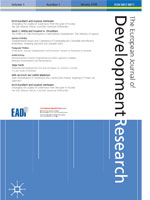
Political patronage and economic opportunity: vertical integration in Egyptian textiles and clothing
El-Haddad, AmirahExternal Publications (2023)
in: The European Journal of Develpment Research 35, 1224-1257
DOI: https://doi.org/10.1057/s41287-023-00580-2
Open access
Utilizing an original data set, this paper demonstrates how protectionist industrial policy during the period of hybrid liberalisation has shaped the organizational structure of clothing firms in Egypt. It investigates determinants of vertical integration of clothing firms into fabric production. High-end market segments are a critical determinant of integration. Limited access to finance restricts the possibilities for many firms to undertake the investment required to integrate, whilst volatile and uncertain market conditions make firms more likely to rely on the market for their inputs. But there are nuances related to market segment. Producers of higher quality garments rely on imported textiles, so these producers do not integrate even if search and switch costs are high. But the opposite is true of producers relying on domestic suppliers. Foreign institutions are better able to ensure contract enforcement with respect to quality and timely delivery so that suppliers opportunistic behaviour is deterred, reducing the necessity of clothing firms to integrate. This may not be the case with respect to domestic suppliers, when domestic institutions do not guarantee the same level of enforcement. The adoption of the hybrid liberalisation model meant that the transition to a market economy was not preceded by the creation of the necessary regulatory framework. This model resulted in inefficient upstream production and in an institutional setting conducive to agency problems. It also meant that business suffers excessive and inefficient bureaucracy. It is thus not possible for firms to achieve the first best outcome of arm’s length relations based on frictionless market transactions. Given these structural constraints firms opt for the second best solution of make rather than buy, i.e. vertical integration. But only some firms are able to use the arbitrary and discretionary decision making system to their favour, negotiating government obstacles to successful business. Those linked to power, prospered, whilst the businesses of others foundered against the wall of patronage, bureaucracy and red tape.

